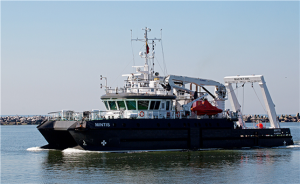Klaipeda University enhances the Lithuanian maritime sector, which is being developed as an integrated system combining fundamental and applied research and experimental development on marine topics, development of science-intensive business, and preparation of highly-skilled professionals in the corresponding areas.
Open Access Centre for Marine Research (http://apc.ku.lt/en) is the subdivision of Klaipėda University, aimed to ensure proper operation of the scientific infrastructure of Marine Valley and open access to the R&D services for internal and external users, to facilitate science and business cooperation through high level scientific and technological research.
Main activities of the Centre are R&D in marine environment and maritime technologies.
R&D infrastructure consists of laboratories:
- Marine Chemistry,
- Marine Ecosystems,
- Marine Constructions Reliability,
- Waterborne Transport Technologies,
- Fleet and Field Research.
Open Access services for science and business:
- Multipurpose research vessel for modern oceanographic research and marine engineering services;
- Analysis of biogeochemical processes and biological components of marine ecosystems;
- Modern marine biotechnology, alternatiev fuel and renewable energy solutions;
- Efficiency of waterborne transport including solutions for efficient energy and polution prevention;
- Marine constructions reliability, monitoring and non-destructive control.
Laboratory carries out complex investigations of marine and coastal environment. It also coordinates the services provided by the fleet and investigations required by scientific and commercial institutions.
Research vessel „Mintis“ – modern laboratory of marine research capable to service multipurpose marine research.
Sailing vessels „Brabander“ and „Odisėja“ operates as a platforms for sailing training, provides services for recreational and educational boating and also takes part in scientific investigations.
Current services are provided by the Laboratory:
- Geological investigations of the sea floor.
Set of investigations includes remote scanning of the sea-bottom, sampling and shallow coring activities allowing obtaining information on type and distribution of superficial sediments, identification of basic geological conditions on the site. Along with results obtained during lab tests of the collected samples and the cores, the service provider is able to characterize the geological setting, composition and basic mechanic properties of the sediments.
- Geophysical investigations onshore, internal waterbodies and open sea.
Complex of geophysical instruments allows investigation of the geological structure of the seabed, shallow seismics is suitable for engineering purposes, deep seismics serves for oil and gas exploration industry. Geophysical profiling is being used in order to identify buried objects – archaeological, military munition, obstacles for underwater infrastructure development projects.
- Investigations of sea bottom morphology.
High resolution full coverage of bathymetric measurements in shallow (up to 40 m) and deep – up to 600 meters waters. Inspection of navigation routes, investigation of changes of port aquatory, dredging operations control, nearshore sediment balance and dynamics, any engineering application offshore, river and lake bathymetry.
- Investigation of marine biodiversity.
This is the complex service of biological, geological and remote investigations. The sampling and analysis of sea floor communities along with visual inspection of the bottom to be provided. The type and distribution of marine habitats is being revealed, qualitative and quantities characteristics of the biodiversity provided.
- Hydrological investigations
The complex of hydrologic investigations would answer the questions on main physical parameters of the water column, such as: content of suspended matter, current velocity, turbidity, salinity, pressure, conductivity, temperature, oxygen content and other. The water samples analysed in the labs also provides with hydro chemical parameters of the water as well as content of biomass
Inga Dailidienė
+370 46398853
inga.dailidiene@ku.lt













